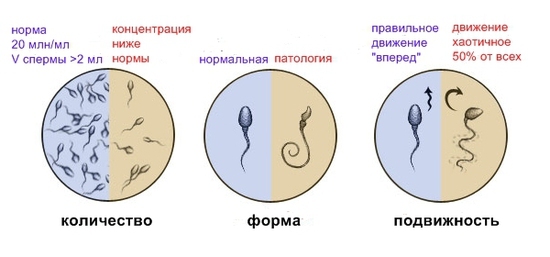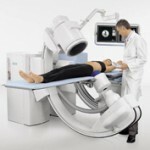Types of male infertility
The sex cell of the male body carrying genetic information is the sperm cell. It is he who merges with the egg gives rise to the development of the embryo. However, in some cases, these two gametes do not occur.
The following forms of male infertility are distinguished:
- secretory - characterized by a decrease in the quantity or deterioration of the quality of spermatozoa;
- obturational - is the presence of an obstacle for the promotion of spermatozoa;
- autoimmune - in this case there is a violation of the hematotestick barrier with the subsequent development of antisperm antibodies.
Secretion infertility
This form of male infertility is characterized by a violation of the sperm production process. As a result, male sex cells can have defects in the structure of the head, motor apparatus( asthenozoospermia), which prevents them from participating in the process of fertilization of the oocyte. Perhaps a sharp decrease in the number of spermatozoa in the ejaculate( oligospermia) or complete absence of them( azoospermia).

Among the most common causes of the development of the secretory form of male infertility, experts call the following:
- Varicocele - with the development of this disease there is a violation of blood flow in the testis tissue. The expressed stagnation of blood causes the compression of the testicular tissue, which breaks the process of synthesis of spermatozoa( see Methods of treatment varicocele);
- Dropsy of the testicle - in this case there is an accumulation of excess fluid in the scrotum. As in varicocele, mechanical compression and impaired blood supply to the testicle tissue lead to the development of the secretory form of male infertility;
- Cryptorchidism - if one or both testicles are not allowed into the scrotum, the temperature of the environment surrounding these organs increases. Spermatogenic epithelium, responsible for the production of spermatozoa, is very sensitive to changes in temperature and, with the development of cryptorchidism, performs its function much worse;
- Epidemic parotitis - for this viral disease is characterized by selective damage to the glandular tissue of the body. That is why the focus of the pathological process is often not only salivary, but also the sex glands. The defeat of the spermatogenic epithelium in parotitis significantly reduces the chances of successful conception in the future.
Obturation infertility
In the case of development of obturation infertility, the process of promoting spermatozoa along the vas deferens pathway is disrupted. Undoubtedly, the chances for successful conception are much higher with unilateral defeat and are practically absent in the bilateral nature of the pathological process.
The main causes of obturation infertility in men are the following factors:
- adhesion process after the transferred epididymitis;
- tumors and cysts of the genital organs;
- cicatricial changes in the vas deferens following surgical intervention;
- congenital strictures of the vas deferens;
- complete absence of the vas deferens.
Autoimmune infertility
About 10% of childless couples do not have any diseases or risk factors that can lead to infertility. In this case, they talk about immunological incompatibility of partners or autoimmune infertility. Confirmation of the diagnosis may be the presence of partners from children from other marriages.
Finally, the presence of immunological incompatibility of partners allows the detection of antisperm antibodies in the ejaculate. These cells of the immune system are produced by damage to the hematotestick barrier, which limits the tissue of the testicles from the environment. Antisperm antibodies thickly cover the surface of spermatozoa, making it difficult to move and merge with the egg.
Determining the type of male infertility allows you to prescribe adequate treatment that can significantly increase reproductive potential.
Recommended for viewing:



